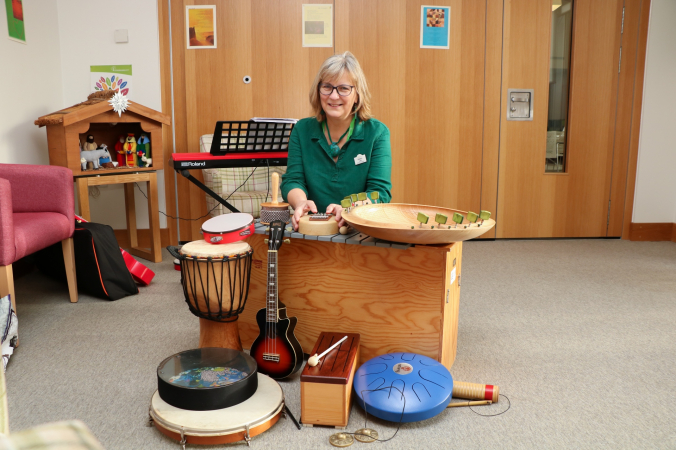Music Therapy
Sometimes it can be difficult to put our thoughts and feelings into words.
Music Therapy can help by offering different ways to express these.
Sometimes it can be difficult to put our thoughts and feelings into words.
Music Therapy can help by offering different ways to express these.
Music therapy is a form of emotional and psychological support that combines music making, listening and talking.
Music can say what cannot be expressed verbally; it can be a way for family members to come together and share memories and experiences; it can provide solace and distraction from pain and anxiety.
Anyone can participate in and benefit from Music Therapy; no musical background or skill is required and it is adapted to the needs of each individual.
Music therapy is provided by qualified music therapists or trainees under supervision in groups, individually and at the bed-side. The post is supported by Anglia Ruskin University, and our trainee is from their MA in Music Therapy.
We are able to work with patients who have been referred to our Inpatient Unit and Living Well Services.
November 2021I didn’t feel very lively before, but when I come here, the music enlivens me. It’s liberating!
Activities can include:
Sessions take place weekly in the Living Well Service and we visit the Inpatient Unit weekly, to offer music therapy to patients and family members.
We are always grateful for any support, so if you would be interested to talk to us specifically about funding an aspect of Music Therapy, please get in touch.
I am able to provide music therapy to you, if you have been referred into the Living Well, Inpatient Unit and Patients and Family Support services.
Thanks to the dedication, commitment and generosity of the local community and the hard work of our senior leadership team to secure vital contracts with the NHS, all our services are free of charge.
It will cost £11.51 million this financial year to operate our services. Contracted services from the NHS are budgeted at £7.07 million, meaning that £4.44 million needs to be raised through donations, fundraising activities and trading.
We are extremely grateful to our local community for the continual dedication, commitment and generosity they show in supporting us to meet this target.

Helen has worked as a music therapist for over 30 years with adults, children and families. She is enthusiastic about the many ways that music can help in palliative care; improving mood and well-being, help with breathing and managing distressing symptoms. She also enjoys providing environmental music around the Hospice for patients, carers and staff, adding: “Music is around us in our lives, on the radio, tv and in our own music collections. We may use music to relax, to raise our mood, or to help us sleep. We are all born musical, and even if we don’t play an instrument, we still have a response to it.”